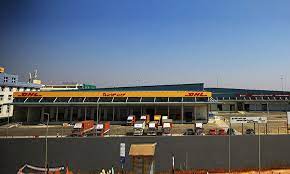A 25 per cent additional tariff on India, summing up to a total tariff of 50 per cent might be a huge setback and will impact chemicals, garments, jewellery, etc,” says Gautham R, Senior Manager – Global Air Freight, Head – Air Freight – India, WIZ. He adds, “Exporters see a challenging situation of losing the larger market share to the countries that have competitive tariffs, which can lead to the reduction in volumes from India to the US by 30-40% approx. if the situation prolongs. MSMEs who will not be able to absorb this sudden shift of cost increase would end up losing their traditional business, as the margins are already thin. We foresee that there may be a slight spike in air freight volumes for critical goods, as the additional 25% is applicable after 21 days, but the majority of the US buyers had kept the orders on hold for India. Airlines ex India would continue to experience the volatility in filling the belly space until we simultaneously find strong alternative markets by capitalizing on recent FTAs.”
Read More »‘The decision may risk disrupting long-standing trade partnerships’
The new tariff regime appears to be rooted in a protectionist push by the U.S. to reduce trade imbalances and reinforce domestic manufacturing,” said, Abhishek Goyal, ED and CEO, Aeroprime Group. He added, “India’s growing footprint in key export sectors has likely drawn increased scrutiny. While such measures may be politically motivated and serve as a tactic to exert pressure for expediting trade negotiations, they risk disrupting long-standing trade partnerships, economic relationships and global supply chains. At Aeroprime, we believe that trade diplomacy and bilateral engagement should take precedence over sudden tariff escalations.”
Read More »CSC launches TURANT app at Cochin International Airport
Cochin International Airport (CIAL) and Cargo Service Center (CSC) organised the Air Cargo Trade Meet 2025 to launch CSC’s TURANT app at the airport, marking a major step in advancing air cargo in Kerala. The app is designed to offer real-time tracking and full visibility of Export and Import shipments. CIAL and CSC brought together leading trade partners, dignitaries, and industry leaders for a gathering focused on growth, collaboration and innovation in the air cargo sector. The TURANT app, which had already been introduced at other major airports, is now expected to raise cargo handling standards in Kerala. It promises to improve transparency, efficiency and trust among both global and local stakeholders. CSC’s leadership noted that the partnership with CIAL reflects their ongoing focus on service excellence, innovation and security. With the launch of TURANT and continued investment in operations, CSC aims to support Kerala’s logistics sector and strengthen India’s air cargo infrastructure.
Read More »CII LogisEast to boost East India’s logistics ecosystem
Building on the momentum created by the West Bengal Logistics Policy 2023, Confederation of Indian Industry (CII) Eastern Region is launching great initiative in the logistics and warehousing sector — CII LogisEast 2025. Scheduled for 12 and 13 August 2025 in meet Kolkata, this initiative aims to strengthen Eastern India’s logistics ecosystem, with West Bengal at the forefront. This comes at a time when India’s logistics industry, valued at over USD 320 billion, is undergoing rapid transformation through reforms like PM Gati Shakti, National Logistics Policy and continued investment in multimodal infrastructure. As the sector modernises, the inclusion of Eastern India in this growth story is essential. In this context, CII LogisEast 2025 aims to catalyse this shift, by enabling collaboration among industry leaders, policymakers, MSMEs and service providers, and by creating opportunities tailored to this region’s logistical strengths and needs. CII will also host a dedicated logistics and supply chain exhibition in Eastern India, as part of LogisEast 2025. The exhibition will showcase a curated range of logistics solutions, offering attendees a valuable opportunity to engage with emerging innovations and industry capabilities. The event is supported by key industry associations such as NACFS, FFFAI and CCHAA. At the press meet, Debashis Dutta, Chairman, CII West Bengal State Council & Director, BGS Group, said, CII LogisEast 2025 is more than just a summit—it is a defining platform that positions West Bengal as the cluster hub for logistics and warehousing, driving the region’s integration into India’s growth story. Ashutosh Jaiswal, Chairman, CII ER Logistics Sub-Committee & CEO and Director, Century Infra Ltd & Century Ports Ltd, stated the event’s central theme, ‘Transforming Logistics in Eastern India: Bridging Gaps and Building the …
Read More »Parandur airport likely to get delayed
Chennai’s second airport at Parandur may be delayed by a year. According to reports, land acquisition poses a major challenge and is one of the primary reasons for the delay of the project. Earlier Tamil Nadu govt planned to complete the land acquisition by October 2025 and start groundwork project by 2026.
Read More »Gadkari unveils 29 NH projects worth 5233 cr in AP
Union Minister for Road Transport and Highways Nitin Gadkari, along with Andhra Pradesh Chief Minister N. Chandrababu Naidu, inaugurated and laid the foundation stone for 29 National Highwayprojects in Mangalagiri on Saturday. The projects, worth over ₹5,233 crore, cover a total length of 272 km and aim to significantly boost connectivity and infrastructure across the state. Addressing the gathering, Gadkari said, “Aligned with the vision of Prime Minister Narendra Modi, these projects are designed to eliminate accident-prone black spots and railway crossings, reduce transportation costs, strengthen last-mile connectivity in rural and tribal areas, and decongest key urban centres such as Tirupati, Nellore, and Rayachoty—thereby positioning Andhra Pradesh at the forefront of India’s growth story.”
Read More »CJ Logistics eyes strategic growth in Indian logistics biz
To focus on India’s rapidly growing logistics sector, supported by infrastructure modernisation and a strong multimodal ecosystem, Jonathan Song, newly appointed CEO of Global Business Division, CJ Logistics visited India marking a significant milestone in the Group’s international engagement strategy. The visit underscored the importance of the Indian market in CJ Logistics’ global network and reaffirmed its commitment to long-term collaboration through its subsidiary, CJ Darcl Logistics. Song’s engagements reflected the Group’s emphasis on enabling technology-led service delivery, strengthening 4PL capabilities, and enhancing omnichannel customer experience in line with its international standards. As part of CJ Logistics’ TES (Technology, Engineering, Systems & Solutions) framework, the company continues to support operational excellence and systems integration across core markets. In India, this translates into deepening collaborative initiatives through digitalization, customer-centric execution, and process innovation. Song said, “India represents immense opportunity through its expanding infrastructure and digitally agile customer base. We are committed to empowering our teams, building meaningful partnerships and driving solutions that reflect global best practices and local relevance.” The visit aligns with CJ Logistics’ broader international vision—leveraging its expansive network and logistics expertise to create integrated value across geographies.
Read More »BIAL completes bond issuance, raises ₹9,000 crore
Bangalore International Airport Limited (BIAL) has successfully concluded the largest unlisted private placement of Non-Convertible Debentures (NCDs) in India’s airport sector, raising a total of ₹9,000 crore. The transaction is being undertaken in two tranches ₹4,362 crore completed on July 25, 2025, and ₹4,638 crore scheduled for early October 2025. SBICAPs acted as the sole arranger for this landmark issuance. With a 15-year tenure, the refinancing allows BIAL to conserve capital and focus resources on funding future expansion plans. The transaction also provides significant savings in borrowing cost, driven by the AAA credit rating, a shift from MCLR-linked (Marginal Cost of funds-based Lending Rate) to fixed interest rate, and the extended maturity profile. Bhaskar Rao, Chief Financial Officer, Bangalore International Airport Limited (BIAL), added, “This landmark issuance is a significant milestone for BIAL as it not only reflects strong investor confidence in our long-term vision, but also strategically strengthens our financial position ahead of the next phase of expansion. The refinancing enables us to optimise our capital structure. Importantly, the long-tenor structure and improved credit rating will translate into greater value for our stakeholders, including passengers and airline partners, through enhanced affordability and infrastructure development.”
Read More »‘Agricultural and dairy product protections remain primary concerns for traders’
Sunil Kohli, MD, Rahat Cargo said, “The sudden announcement of a 25 per cent tariff on Indian goods, while higher than anticipated, broadly falls within the 15–20 per cent range that markets had been bracing for. This could well weigh on near-term export competitiveness and trigger currency volatility if sentiment deteriorates. What is more concerning is the penalty clause, which remains unquantified at this stage. However, if the tariffs stay at 25 per cent for an extended period, the impact could be significantly negative. The agricultural and dairy product protections remain primary concerns, as these sectors are politically and economically sensitive for India. Hence, India is negotiating with the US against any tariff reductions on dairy, rice, wheat and genetically modified (GM) crops like corn and soybeans citing the livelihoods of over 700 million rural citizens, including 80 million smallholder dairy farmers. Many Indian exporters are now preparing for the worst. The newly imposed tariff could affect products like gems and jewellery, auto parts, seafood, textiles and chemicals as these are major exports to the US. In 2024, India exported goods worth $87 billion to the US and hence any drop in the exports is likely to hit the shippers. The next steps are unclear. While Trump has announced the 25% tariff from August 1, he has also said talks are continuing. A US trade team is expected to visit India in August for further negotiations. Whether this visit leads to any resolution remains to be seen and let us hope that the further deliberations lead to certain positive outcomes yielding relief to the trade fraternity in India.”
Read More »‘Indian govt’s response on staying committed to negotiations might help cut tariffs’
Balagopal Balachandran, National Head – Air Freight, FEI Cargo said, “It is an unfortunate development, particularly given the strong strategic partnership that has been steadily built between India and the USA in recent years. According to UN COMTRADE data, India’s trade with the US nearly doubled over the last decade, rising from $64.6 billion in 2013 to $118.4 billion in 2024. Exports have led the charge, climbing 89.3 per cent, from $42 billion in 2013 to $79.4 billion in 2024, while imports have grown more moderately. The tariff hike will have major consequences for high-growth sectors such as chemicals, pharma, machinery and electronics, which have seen significant export gains in the past decade. While this move is unfortunate and will have a clear dent on our exports, we hope that this imposition of higher tariffs will be a short term and that a permanent trade deal between the two sides will be finalised soon. It is worth noting that 18% of India’s overall export goes to the US. To mitigate the impact of these tariffs, India may consider diversifying its export markets, increase domestic value addition, enhancing competitiveness and engaging in diplomatic efforts to resolve trade disputes. Another way to interpret the 25% tariff announcement is to see it as a starting point for renewed negotiation. The Indian government’s response on staying committed to the negotiations speak to that, as India in recent past got favourable trade deals with major partners like Japan, the UK and the European Union.”
Read More » Cargo Breaking News
Cargo Breaking News









